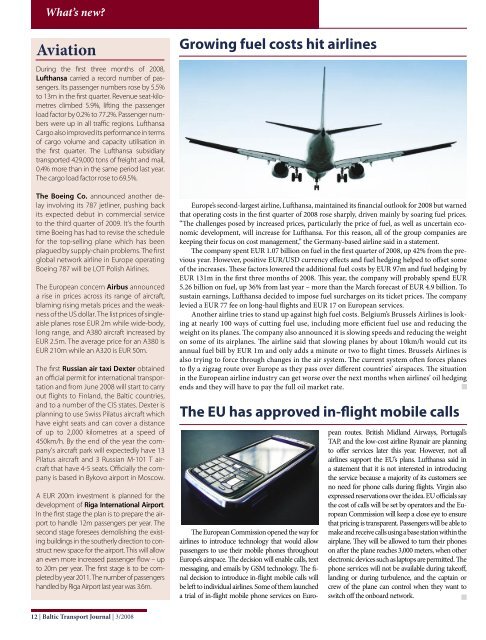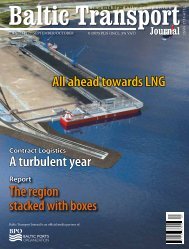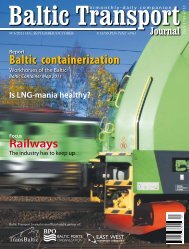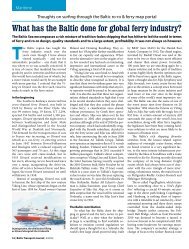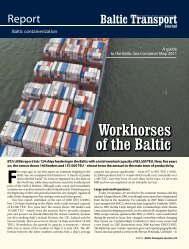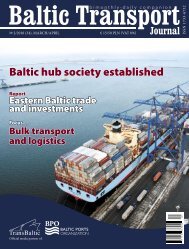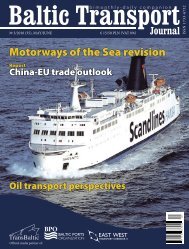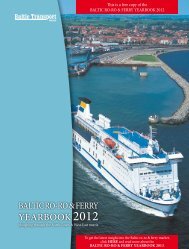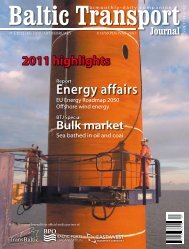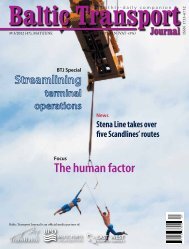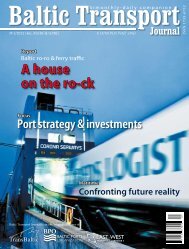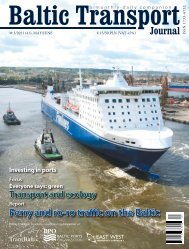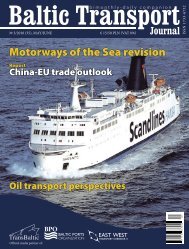Create successful ePaper yourself
Turn your PDF publications into a flip-book with our unique Google optimized e-Paper software.
What’s new?<br />
Aviation<br />
During the first three months of <strong>2008</strong>,<br />
Lufthansa carried a record number of passengers.<br />
Its passenger numbers rose by 5.5%<br />
to 13m in the first quarter. Revenue seat-kilometres<br />
climbed 5.9%, lifting the passenger<br />
load factor by 0.2% to 77.2%. Passenger numbers<br />
were up in all traffic regions. Lufthansa<br />
Cargo also improved its performance in terms<br />
of cargo volume and capacity utilisation in<br />
the first quarter. The Lufthansa subsidiary<br />
transported 429,000 tons of freight and mail,<br />
0.4% more than in the same period last year.<br />
The cargo load factor rose to 69.5%.<br />
The Boeing Co. announced another delay<br />
involving its 787 jetliner, pushing back<br />
its expected debut in commercial service<br />
to the third quarter of 2009. It’s the fourth<br />
time Boeing has had to revise the schedule<br />
for the top-selling plane which has been<br />
plagued by supply-chain problems. The first<br />
global network airline in Europe operating<br />
Boeing 787 will be LOT Polish Airlines.<br />
The European concern Airbus announced<br />
a rise in prices across its range of aircraft,<br />
blaming rising metals prices and the weakness<br />
of the US dollar. The list prices of singleaisle<br />
planes rose EUR 2m while wide-body,<br />
long range, and A380 aircraft increased by<br />
EUR 2.5m. The average price for an A380 is<br />
EUR 210m while an A320 is EUR 50m.<br />
The first Russian air taxi Dexter obtained<br />
an official permit for international transportation<br />
and from June <strong>2008</strong> will start to carry<br />
out flights to Finland, the <strong>Baltic</strong> countries,<br />
and to a number of the CIS states. Dexter is<br />
planning to use Swiss Pilatus aircraft which<br />
have eight seats and can cover a distance<br />
of up to 2,000 kilometres at a speed of<br />
450km/h. By the end of the year the company’s<br />
aircraft park will expectedly have 13<br />
Pilatus aircraft and 3 Russian M-101 T aircraft<br />
that have 4-5 seats. Officially the company<br />
is based in Bykovo airport in Moscow.<br />
A EUR 200m investment is planned for the<br />
development of Riga International Airport.<br />
In the first stage the plan is to prepare the airport<br />
to handle 12m passengers per year. The<br />
second stage foresees demolishing the existing<br />
buildings in the southerly direction to construct<br />
new space for the airport. This will allow<br />
an even more increased passenger flow – up<br />
to 20m per year. The first stage is to be completed<br />
by year 2011. The number of passengers<br />
handled by Riga Airport last year was 3.6m.<br />
12 | <strong>Baltic</strong> <strong>Transport</strong> <strong>Journal</strong> | 3/<strong>2008</strong><br />
Growing fuel costs hit airlines<br />
Europe’s second-largest airline, Lufthansa, maintained its financial outlook for <strong>2008</strong> but warned<br />
that operating costs in the first quarter of <strong>2008</strong> rose sharply, driven mainly by soaring fuel prices.<br />
“The challenges posed by increased prices, particularly the price of fuel, as well as uncertain economic<br />
development, will increase for Lufthansa. For this reason, all of the group companies are<br />
keeping their focus on cost management,” the Germany-based airline said in a statement.<br />
The company spent EUR 1.07 billion on fuel in the first quarter of <strong>2008</strong>, up 42% from the previous<br />
year. However, positive EUR/USD currency effects and fuel hedging helped to offset some<br />
of the increases. These factors lowered the additional fuel costs by EUR 97m and fuel hedging by<br />
EUR 131m in the first three months of <strong>2008</strong>. This year, the company will probably spend EUR<br />
5.26 billion on fuel, up 36% from last year – more than the March forecast of EUR 4.9 billion. To<br />
sustain earnings, Lufthansa decided to impose fuel surcharges on its ticket prices. The company<br />
levied a EUR 77 fee on long-haul flights and EUR 17 on European services.<br />
Another airline tries to stand up against high fuel costs. Belgium’s Brussels Airlines is looking<br />
at nearly 100 ways of cutting fuel use, including more efficient fuel use and reducing the<br />
weight on its planes. The company also announced it is slowing speeds and reducing the weight<br />
on some of its airplanes. The airline said that slowing planes by about 10km/h would cut its<br />
annual fuel bill by EUR 1m and only adds a minute or two to flight times. Brussels Airlines is<br />
also trying to force through changes in the air system. The current system often forces planes<br />
to fly a zigzag route over Europe as they pass over different countries’ airspaces. The situation<br />
in the European airline industry can get worse over the next months when airlines’ oil hedging<br />
ends and they will have to pay the full oil market rate.<br />
The EU has approved in-flight mobile calls<br />
The European Commission opened the way for<br />
airlines to introduce technology that would allow<br />
passengers to use their mobile phones throughout<br />
Europe’s airspace. The decision will enable calls, text<br />
messaging, and emails by GSM technology. The final<br />
decision to introduce in-flight mobile calls will<br />
be left to individual airlines. Some of them launched<br />
a trial of in-flight mobile phone services on Euro-<br />
pean routes. British Midland Airways, Portugal’s<br />
TAP, and the low-cost airline Ryanair are planning<br />
to offer services later this year. However, not all<br />
airlines support the EU’s plans. Lufthansa said in<br />
a statement that it is not interested in introducing<br />
the service because a majority of its customers see<br />
no need for phone calls during flights. Virgin also<br />
expressed reservations over the idea. EU officials say<br />
the cost of calls will be set by operators and the European<br />
Commission will keep a close eye to ensure<br />
that pricing is transparent. Passengers will be able to<br />
make and receive calls using a base station within the<br />
airplane. They will be allowed to turn their phones<br />
on after the plane reaches 3,000 meters, when other<br />
electronic devices such as laptops are permitted. The<br />
phone services will not be available during takeoff,<br />
landing or during turbulence, and the captain or<br />
crew of the plane can control when they want to<br />
switch off the onboard network.


